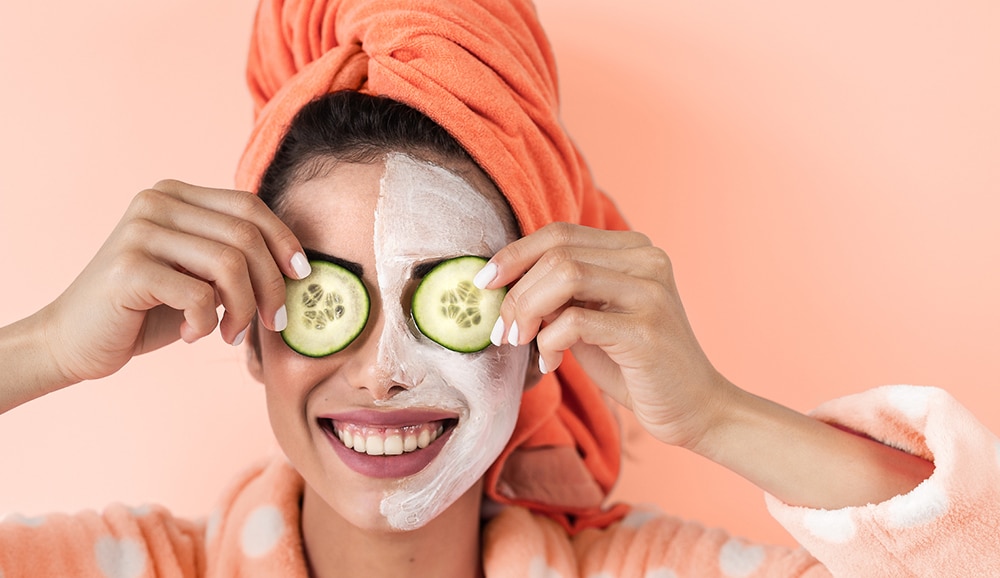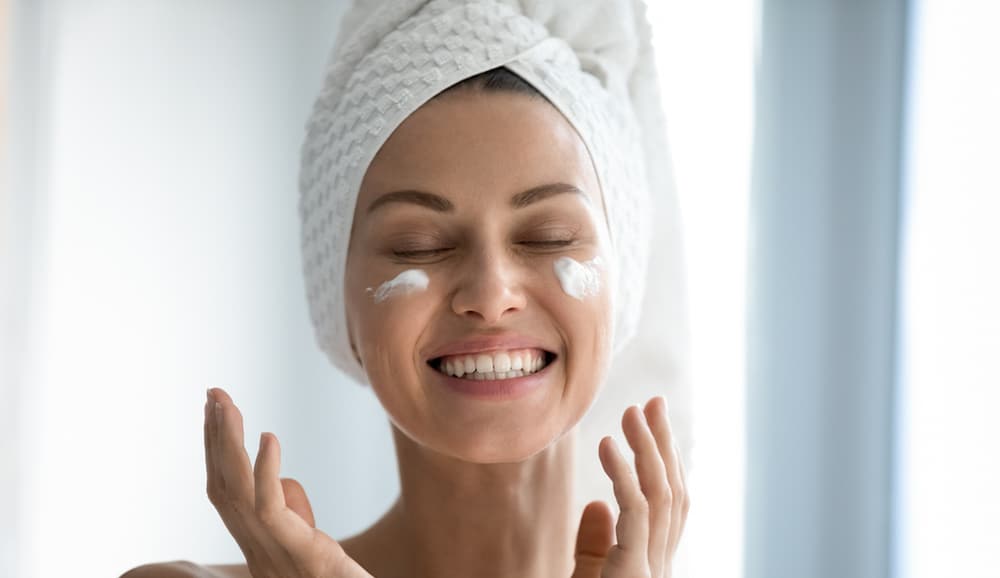5 Steps to a Good Skin Care Routine
As the body’s largest and most visible organ, the skin is a mirror of our wellbeing. As we age, maintaining healthy skin becomes a priority for many.
Today, our skin cells face greater challenges than those of previous generations. UV radiation, pollution, and excess exposure to chemicals are on the rise. Plus, our diets often lack essential nutrients for good skin health.
Fortunately, there are steps we can take to support our skin.
Here are 5 skin care routine steps for glowing skin and long-term skin health:
- Start From Within
- Keep It Simple
- Cleanse to Remove Impurities
- Moisturize with Good Nutrients
- Wear Sun Protection
Skin Care Routine Steps For Healthy Skin
Step 1: Start From Within
The foundation of any good skincare routine actually begins well before you use any products. What you eat and drink – and how you take care of your body – impacts your skin’s appearance just as much as the products you apply.
Importance of Staying Hydrated
Staying hydrated is important for so many reasons, including healthy skin. Drinking plenty of water throughout the day helps keep your skin looking fresh and plump, while preventing dryness and dullness.
A 2015 study examined the effects of dietary water intake on skin physiology in healthy women. Results showed that participants who initially consumed less than 3200 mL of water per day experienced significant improvements in both superficial and deep skin hydration, as well as enhanced skin elasticity, when they received an extra water for 30 days. The researchers concluded that increased water intake can positively impact skin health [1].
Omega 3 Fatty Acids For Skin Health
Omega-3 fatty acids are also essential for skin health, playing a key role in reducing inflammation and maintaining a strong moisture barrier [2]. These fatty acids make up an important part of the skin cell membranes. They promote a better mixture of lipids in the skin, helping strengthen the skin barrier and keeping it elastic.
Studies have shown that omega-3s, such as those found in fatty fish or fish oil supplements, can help improve skin conditions like acne while supporting overall skin hydration [3].
Omega-3s can also help combat certain inflammatory skin conditions. A review by faculty at the University of Alberta’s Division of Dermatology analyzed 38 studies on omega-3 fatty acid supplementation and its impact on skin health. The review indicated benefits for conditions like psoriasis, atopic dermatitis, and skin ulcers [2].
Prioritize Sleep
Good quality sleep helps the body produce collagen [4]. The inverse is also true – without enough sleep, less collagen will be produced, causing wrinkles and sagging skin. Plus, studies show that even one day of sleep deprivation significantly reduces skin hydration [5].
Sleep also has a hand in regulating inflammation. Not getting enough zzz’s increases the risk of inflammation-related skin issues, like acne, rosacea, psoriasis [5]. On the flip side, sleeping enough helps with skin homeostasis and maintaining a healthy skin barrier.
The Anti Aging Effects of Exercise
Regular exercise increases blood flow, transporting oxygen and nutrients to your skin. It’s also associated with improved skin moisture, which is another great reason to establish a good exercise routine [6].

Step 2: Keep It Simple
The allure of many beauty products with pleasing perfumes, fancy containers and the promise of eternal youthfulness can easily empty your bank account. Unfortunately, too many skin products contain synthetic chemicals, additives, microplastics, preservatives and more.
All of these chemicals present a few problems. For one, these ingredients have the potential to disturb the microbiome or bacterial flora that naturally protects your skin. They can also cause skin irritation and allergies.
With some ingredients, there are concerns about long-term safety, too. For example, some cosmetic ingredients, like parabens, are known to be endocrine disruptors [7]. Endocrine disrupting chemicals are linked with a host of health issues, like fertility problems, immune issues and more.
Studies link overusing cosmetics with sensitive skin [8]. Indeed, some researchers believe the synthetic chemicals in many cosmetic products could be contributing to the rapid increase in skin damage and skin irritation worldwide [9].
The moral of the story is this: Keep your skin care routine minimal and read the ingredient labels to see what’s inside. The more products you use, the more you risk creating problems for your skin.
Step 3: Cleanse to Remove Impurities
Cleansing the face often tops the list of many beauty advice columns – and with good reason. Cleansing helps remove dirt, makeup, sunscreen, and environmental impurities that build up on your skin throughout the day.
Cleaning your face every day is especially important if you wear makeup. Worn overnight, cosmetics can clog your pores, worsen your complexion and even lead to infections.
To clean your face, a good cleanser can make all the difference. Many environmental pollutants and cosmetics are not water soluble, so you’ll need more than a splash in the sink to get those nasties off your face [10].
A gentle cleanser will remove pollutants without stripping your skin of its natural oils, which are essential for maintaining a healthy skin barrier. For those with sensitive skin, choosing a non-foaming, hydrating cleanser can help maintain moisture levels.
Step 4: Moisturize with Good Nutrients
A good moisturizer does more than just hydrate; it can help create a protective barrier on the skin, locking in moisture and preventing transepidermal water loss. This is especially important for maintaining the integrity of your skin barrier, which protects against environmental damage and irritation.
When looking for moisturizers, seek out products that contain natural substances like:
- Hyaluronic acid: Hyaluronic acid is well regarded for its moisturizing and anti-aging effects. It’s also considered to be one of the safest and most effective ingredients frequently used in cosmetics [11].
- Oatmeal: Oat-based ingredients, like colloidal oatmeal and oat fiber rich in beta-glucans, are excellent moisturizers. These fibers help absorb water. They’re also known for their soothing, anti-irritating properties and may even help with skin repair [12].
- Ceramides: Ceramides are essential lipids in the outer layer of the skin that help maintain its protective barrier by locking in moisture and keeping harmful elements out. Using skincare products with ceramides or similar lipids can help restore this barrier and improve skin health [13].
- Omega-3s: When most people talk about omega-3 and skin health, they’re usually discussing the effects of ingesting these fatty acids. But omega-3s actually have a long history in topical medicine too. The Ancient Greeks used fish liver oils to treat skin eruptions, and in northern Europe, fishermen would squeeze cod liver oil onto their hands to manage wounds and rope burns [14]. There are relatively few skin creams that contain omega-3s from marine sources – but one exception is Omega3 Innovation’s Barristrong skin cream. Barristrong is also free of fragrances, parabens, preservatives, and fillers, making it a good choice for people who want to nourish their skin without excess chemicals.
Step 5: Wear Sun Protection
The final and perhaps most important step in any skincare routine is sun protection. Exposure to harmful UV rays from the sun is the leading cause of premature aging [15], contributing to wrinkles, dark spots, and loss of elasticity. Even more concerning, prolonged UV exposure increases the risk of skin cancer.
To protect your skin, it’s best to use a broad-spectrum sunscreen with at least SPF 30 daily, no matter the weather. Even on cloudy or cooler days, UV rays can still penetrate the skin and cause damage.
Applying sunscreen should be a regular part of your morning routine. Reapplication throughout the day is also important, especially if you are spending extended time outdoors or sweating.
With this said, there is some controversy about the long-term safety of many sunscreen ingredients today. For the time being, the FDA has deemed zinc oxide and titanium dioxide – two active ingredients in mineral-based sunscreens – as GRASE (Generally Regarded as Safe and Effective).
If you are out in direct sun, using a wide-brimmed hat can also amp up your sun protection. But hats may not be enough on their own, depending on the angle of the sun.

Add Omega 3s To Your Skincare Routine For Healthy Skin
Incorporating omega-3s into your skincare routine can deliver significant benefits for your skin’s health and appearance.
Omega3 Innovations’ Barristrong skin cream is formulated with a high concentration of omega-3s, providing anti-inflammatory properties that help soothe irritated skin and support your skin’s natural moisture barrier. This cream nourishes the skin with essential fatty acids, leaving it feeling hydrated, smooth, and refreshed.
Omega-3s are known for their ability to reduce inflammation and improve skin hydration, making them a powerful addition to any skincare routine. By adding omega-3-rich products like Barristrong to your daily regimen, you’re helping to strengthen your skin’s barrier, protect against environmental stressors, and promote a healthy, radiant complexion.
- Palma, L., Marques, L. T., Bujan, J., & Rodrigues, L. M. (2015). Dietary Water Affects Human Skin Hydration and Biomechanics. Clinical, Cosmetic and Investigational Dermatology, 8, 413–421. https://doi.org/10.2147/CCID.S86822
- Thomsen, B. J., Chow, E. Y., Sapijaszko, M. J. The Potential Uses of Omega-3 Fatty Acids in Dermatology: A Review. Journal of Cutaneous Medicine and Surger. 2020;24(5):481-494. doi:10.1177/1203475420929925
- Thomas, L. 16 July 2024. Omega-3 Fatty Acids Found to Significantly Reduce Acne in New Study. News-Medical Life Sciences.
- Kahan V, Andersen, M.L., Tomimoir, J., Tufik, S. Can Poor Sleep Affect Skin Integrity? Medical Hypotheses, 2010; 75(6): 535-537. https://doi.org/10.1016/j.mehy.2010.07.018.
- Afzal, U.M. & Ali, F.R. Sleep Deprivation and the Skin, Clinical and Experimental Dermatology, 2023; 48(10): 113–1116. https://doi.org/10.1093/ced/llad196
- Oizumi R, Sugimoto Y, Aibara H. The Potential of Exercise on Lifestyle and Skin Function: Narrative Review. JMIR Dermatology. 2024;7:e51962. doi:10.2196/51962
- Panico, A., Serio, F., Bagordo, F. et al. Skin Safety and Health Prevention: An Overview of Chemicals in Cosmetic Products. Journal of Preventive Medicine & Hygiene. 2019;60(1):E50-E57. doi:10.15167/2421-4248/jpmh2019.60.1.1080
- Jiang, C. et al. Sensitive Skin Syndrome: Research Progress on Mechanisms and Applications. Journal of Dermatologic Science and Cosmetic Technology. 2024, 1(2). https://doi.org/10.1016/j.jdsct.2024.100015
- Mim MF, Sikder MH, Chowdhury MZH, Bhuiyan AU, Zinan N, Islam SMN. The Dynamic Relationship Between Skin Microbiomes and Personal Care Products: A Comprehensive Review. Heliyon. 2024;10(14):e34549. doi:10.1016/j.heliyon.2024.e34549
- Blaak, J., Grabmann, S., Simon, I., Callaghan, T. & Staib, P. Five Dimensions of Cleansing: A Holistic View on the Facets and Importance of Skin Cleansing. International Journal of Cosmetic Science. 2023; 45(5), 557-571. https://doi.org/10.1111/ics.12879
- Juncan AM, Moisă DG, Santini A, et al. Advantages of Hyaluronic Acid and Its Combination with Other Bioactive Ingredients in Cosmeceuticals. Molecules. 2021;26(15):4429. doi:10.3390/molecules26154429
- Du, B., Bian, Z., & Xu, B. (2014). Skin Health Promotion Effects of Natural Beta-Glucan Derived from Cereals and Microorganisms: A Review. Phytotherapy Research : PTR, 28(2), 159–166. https://doi.org/10.1002/ptr.4963
- Coderch L, López O, de la Maza A, Parra JL. Ceramides and Skin Function. American Journal of Clinical Dermatology. 2003;4(2):107-129. doi:10.2165/00128071-200304020-00004
- Guy RA. The History of Cod Liver Oil as a Remedy. American Journal of Diseases of Children. 1923;26(2):112–116. doi:10.1001/archpedi.1923.04120140011002
- (5 February 2024). Health Effects of UV Radiation. United States Environmental Protection Agency.
Popular posts



Related posts






